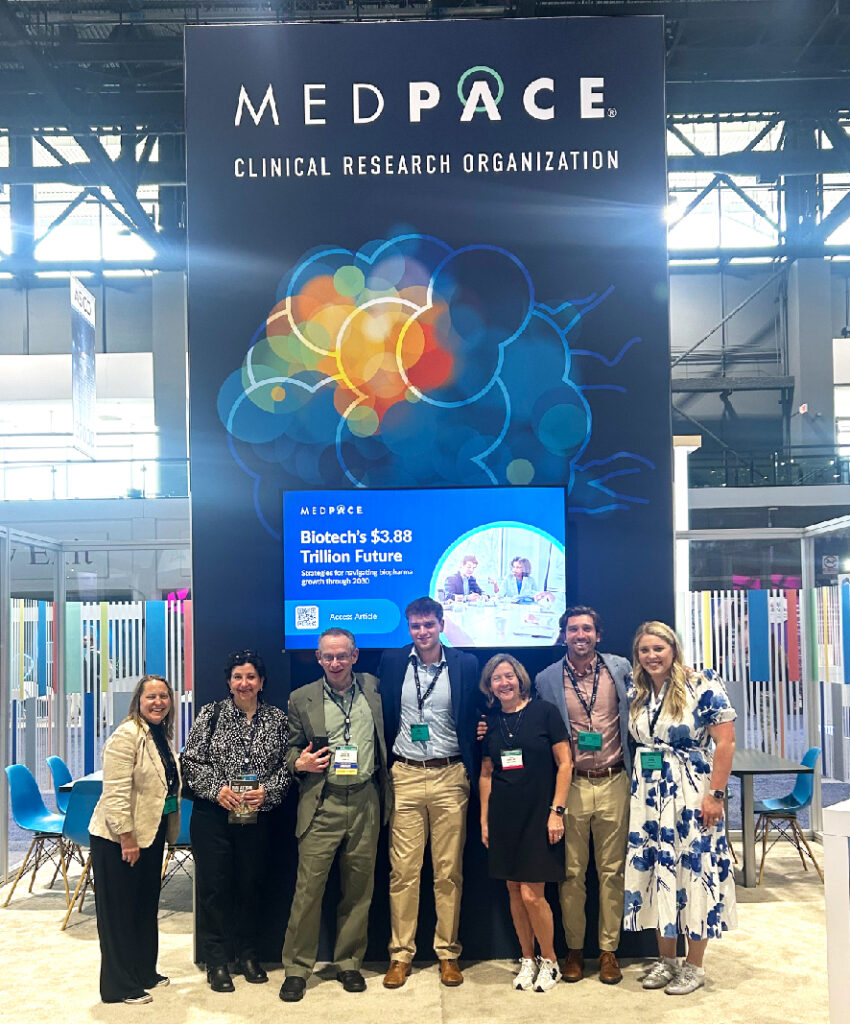How Biopharma is Driving the Next Wave of Cancer Clinical Development in Six Next-Gen Areas
Lyon Gleich, MD, Senior Vice President, Hematology & Oncology, Blythe Thomson, MD, Senior Vice President, Hematology & Oncology, and Debbie Elliott, PhD, Vice President, Clinical Trial Management, examine the clinical and operational concepts driving the next phase of oncology development.
Oncology innovation is no longer defined solely by scientific discovery. It’s increasingly measured by how effectively those discoveries are translated into meaningful clinical progress. At the 2025 American Society of Clinical Oncology (ASCO) Annual Meeting, appropriately themed, “Driving Knowledge to Action: Building a Better Future,” Sponsors showcased how oncology development is not only advancing, but accelerating, with biopharma leading much of that momentum through progressively innovative and targeted programs. Below, Medpace oncology experts examine six concepts that stood out during this year’s meeting, offering a clinical and operational lens into where oncology innovation is headed next, and what it will take to keep it in motion.

Next-Gen Concepts Driving Innovation in Oncology Clinical Development
1. Integrating Targeted Therapies and Immuno-Oncology Mechanisms to Advance Treatment Precision
ASCO highlighted a growing convergence between targeted therapies and immuno-oncology. Sponsors showcased trials built around complementary mechanisms, such as ADCs with novel payloads, DACs targeting protein degradation, and bispecific antibodies designed for tumor selectivity. CAR-T therapies, checkpoint inhibitors, and bispecific antibodies are being explored not just as monotherapies but in thoughtfully sequenced or simultaneous regimens. Meanwhile, cell and gene therapies continue to expand, reflecting ongoing commitment to curative-intent platform innovation.
“We’re moving toward a more nuanced understanding of how to combine and sequence therapies based on mechanism of action, tumor biology, and patient-specific factors. The goal is to enhance anti-tumor activity while maintaining an acceptable safety profile,” shares Dr. Gleich.
2. Leveraging Biomarker-Driven Precision Oncology for Smarter, More Selective Trial Design
Sessions emphasized that precision oncology is now central to trial design. Sponsors are applying biomarkers earlier to improve enrichment strategies and inform real-time decisions. Liquid biopsy and ctDNA use are rapidly expanding, not only for monitoring screening and stratification, but also for monitoring resistance. Tumor-agnostic development strategies based on molecular signatures continue to gain regulatory traction.
“Precision oncology is fundamentally reshaping clinical trial design. As clinicians, we’re using biomarkers not only to guide treatment selection, but to better understand disease biology, predict response, and proactively manage resistance,” shares Dr. Thomson.
3. Bispecific and Next-Generation ADCs – Redefining Targeted Oncology
Bispecific antibodies and proteins were featured at ASCO, reflecting their growing potential across oncology. These engineered molecules are designed to engage two distinct targets simultaneously, often recruiting T-cells to tumor cells or enhancing dual-pathway inhibition. With greater modularity and improved half-life, next generation bispecifics are demonstrating early signs of both increased potency and broader applicability beyond hematologic malignancies.
In parallel, the antibody-drug conjugate (ADC) field continues to mature. Sponsors are refining linker technologies, optimizing cytotoxic payloads, and expanding into new targets and indications to improve therapeutic windows. Together, bispecific antibodies and ADCs represent a meaningful evolution in targeted therapy, with the potential to reshape standard-of-care paradigms in multiple cancer types.
4. Applying Combination Strategies and Adaptive Designs to Accelerate Development and Enhance Insights
ASCO sessions highlighted how combination approaches and adaptive study designs are becoming foundational in oncology. Sponsors are designing rational combinations, pairing checkpoint inhibitors with targeted agents and ADCs, to address resistance and prolong response. Adaptive models like basket and umbrella trials were prominently featured, with 25% of oncology trials in 2024 employing such frameworks. These designs improve agility, decision-making, and operational efficiency.
“Innovative trial designs are no longer experimental; they’re essential. Sponsors are looking for models that allow them to ask more complex clinical questions while maintaining operational control, regulatory alignment, and efficacy at scale,” shares Dr. Elliott.
5. Executing Global Oncology Trials with Regional Agility and Strategic Site Diversification
Sponsors are increasingly pursuing global trial strategies to optimize enrollment, improve diversity, and expedite timelines. Countries across Asia Pacific, Eastern Europe, and Latin America are becoming vital to global oncology trials. With this global reach comes complexity (such as differences in standard of care, infrastructure, and regulatory pathways) demanding sophisticated planning and regional agility. For emerging biopharma especially, global site diversification is now a competitive imperative.
6. Advancing Precision & Safety by Designing Therapies with Greater Efficacy and Lower Toxicity
As the number of agents in development grows, biopharma must differentiate not just on efficacy, but on safety and patient experience. ASCO featured numerous platforms aiming to minimize off-target effects via conditionally active technologies, tumor-selective payloads, and precision dosing. From early-stage trials onward, Sponsors are prioritizing real-world safety and engineering tolerability into product profiles, helping position assets for long-term value and adoption.
Turning Oncologic Innovation into Execution
Bringing next-generation therapies to patients requires more than scientific insight; it demands operational precision, global coordination, and clinical expertise embedded at every stage. Medpace’s full-service CRO model is built to support biopharma innovators with deep oncology specialization, in-house medical leadership, and proven execution across solid tumors and hematologic malignancies.
From ADCs and cell therapies to biomarker-driven strategies and radiopharmaceuticals, Medpace provides the end-to-end support to help translate complex science into regulatory and commercial success.
References
- The American Society of Clinical Oncology (ASCO). (2025). Conference Program Guide. 2025 ASCO Annual Meeting, Chicago, Illinois. Available from